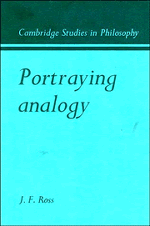Book contents
- Frontmatter
- Contents
- Dedication
- Preface
- Introduction
- 1 The limitations of classical analogy theory and the Miller's Analogies transition
- 2 The genus: meaning differentiation
- 3 Predicate schemes: an explanatory model
- 4 Equivocation, analogy and metaphor
- 5 Denominative analogy and paronymy
- 6 Figurative discourse
- 7 Analogy and religious discourse: craftbound discourse
- 8 Analogy and analysis
- Notes
- Bibliography
- Name index
- Subject index
7 - Analogy and religious discourse: craftbound discourse
Published online by Cambridge University Press: 07 October 2011
- Frontmatter
- Contents
- Dedication
- Preface
- Introduction
- 1 The limitations of classical analogy theory and the Miller's Analogies transition
- 2 The genus: meaning differentiation
- 3 Predicate schemes: an explanatory model
- 4 Equivocation, analogy and metaphor
- 5 Denominative analogy and paronymy
- 6 Figurative discourse
- 7 Analogy and religious discourse: craftbound discourse
- 8 Analogy and analysis
- Notes
- Bibliography
- Name index
- Subject index
Summary
RECONCEIVING THE PROBLEM
The central issues in the dispute about the cognitive content of Judeo-Christian religious discourse are not peculiar to religion. Metaphysical, ethical, aesthetic, legal and scientific discourse raise generically the same issues. They are all craftbound and their vocabularies are similarly embedded by analogy in other craft discourse and in unbound discourse.
The business discourse of plumbers, football coaches, mechanics, philosophers, physicists, physicians and lawyers is paradigmatically craftbound. That name, ‘craftbound discourse’, connotes that skill in action is necessary for a full grasp of the discourse. Ordinarily you master a craftbound discourse only if you become an ‘insider’ to the doing that the discourse is about.
The basic vocabulary of these kinds of discourse is similarly anchored to benchmark situations (legal cases, Scripture stories, scientific experiments, particular professional observations and responses) that structure and stabilize the central meaning relationships.
So, although the immediate subject matter of this chapter is the religious discourse of relatively orthodox Christianity, the forms of argument, the general strategy and the specific analogy claims apply to any craftbound discourse whose cognitive content is challenged and, in particular, apply to explaining the relationship of theoretical predicates in science to ‘observational predicates in discourse that is independent’ of the theory. To illustrate that generality, I provide some examples from legal discourse and refer to further discussion of jurisprudence in chapter 8.
- Type
- Chapter
- Information
- Portraying Analogy , pp. 158 - 178Publisher: Cambridge University PressPrint publication year: 1982



